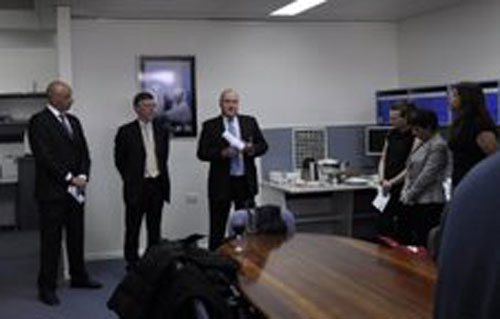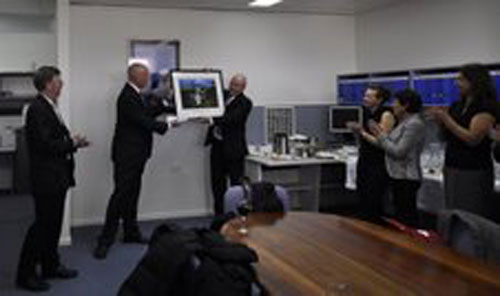The Tasmanian Minister for Economic Development, Mr Michael Aird, formally opened the new offices in Hobart for the Secretariat of the international Agreement on the Conservation of Albatrosses and Petrels (ACAP) on Friday 6 November. The offices, at 27 Salamanca Square, Hobart, are situated immediately next door to the previous shared offices, which had become too small for the Secretariat's staff.
Mr Aird said that the Tasmanian Government was proud to host the prestigious international Secretariat which works to address the conservation of vulnerable seabirds. "The Agreement seeks to conserve albatrosses and petrels by coordinating international activity to mitigate known threats to albatross and petrel populations. Nineteen of the 22 species of albatross are under threat of extinction.

Minister Michael Aird opens the Secretariat's new offices, with Dr Marco Favero, Chair, ACAP Advisory Committee and Warren Papworth, ACAP Executive Secretary to his left and Valeria Carvajal, ACAP's National Contact Point for Chile, to the far right. Photograph by Wiesława Misiak, ACAP Science Officer
The Tasmanian Government, through the Department of Economic Development, Tourism and the Arts, assists ACAP by providing office facilities, communication systems and administrative support. Further activity occurs through the Department of Primary Industries, Parks, Water and the Environment, with important conservation management programmes underway on eight of the 29 albatross and petrel species that are listed by ACAP".

Marco Favero presents a framed photograph to the Minister, as a token of ACAP's appreciation to the Government of Tasmania for its continued support. Photograph by Wiesława Misiak, ACAP Science Officer.
Mr Warren Papworth, Executive Secretary of ACAP, said that it was fitting for the Secretariat to be housed in Hobart as it was a Tasmanian scientist, Nigel Brothers, who first identified the threat to albatross and petrel populations from long-line fishing operations. His efforts galvanised international action for the creation of ACAP.
"We now have the facilities to house visiting scientists, increasing the opportunities for collaborative efforts in the critical work of the ACAP Agreement," Mr Papworth said.
News from the ACAP Secretariat, 09 November 2009

 Français
Français  English
English  Español
Español